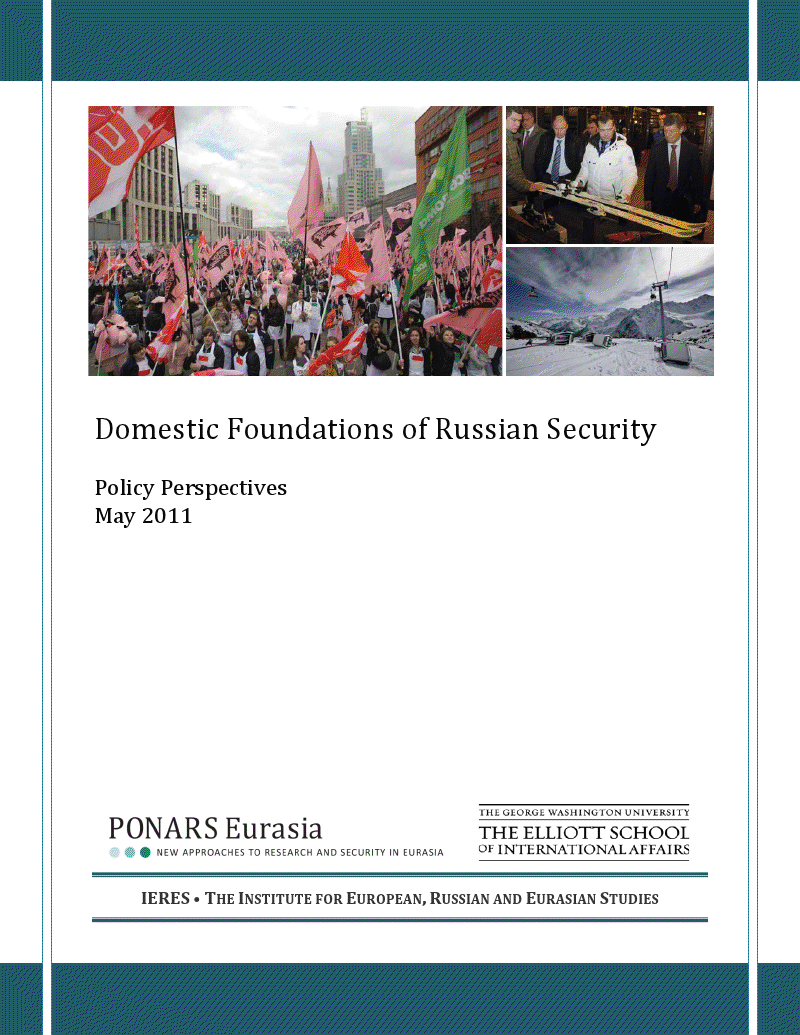Foreword
By Cory Welt
The George Washington University
This collection of essays is based on the proceedings of a March 2011 workshop of the Program on New Approaches to Research and Security in Eurasia (PONARS Eurasia), held in collaboration with the Institute of World Economy and International Relations (IMEMO), Russian Academy of Sciences, Moscow. PONARS Eurasia is a program that promotes scholarly work and policy engagement on transnational and comparative topics within the Eurasian space, based on the expertise of a global network of social scientists.
The workshop—on Security Challenges in Russia and Eurasia—brought together scholars and experts from the Russian Federation, the United States, and Europe (including Ukraine and Azerbaijan) to propose initiatives for deepening international security cooperation in Eurasia; to consider the implications of changing relationships between Russia, the EU, and countries of post-Soviet Eastern Europe and the Caucasus; and to assess the domestic foundations of Russian security and democratic stability. We are publishing twenty-three essays from the workshop in three collected volumes, of which this is the third.
This volume, Domestic Foundations of Russian Security, assesses the prospects for reform in core security, political, and educational institutions in Russia and examines the changing dynamics of insurgency and state response in the North Caucasus. The three essays in Part I identify institutional legacies hindering reform of security and political institutions in Russia today. Focusing on the defense industry, Alla Kassianova lauds the Russian government for properly identifying key gaps in innovation, quality control, and cost control and its turn toward industry modernization and international cooperation as solutions. Nonetheless, she takes a dim view of the ability of Russia’s state-controlled industry to reform itself from the top-down. Brian Taylor closely examines the frequent assumption of continuity between Soviet and Russian security organs. While rejecting several alleged legacies as explanations for structures that have roots in Russia’s current transition or are common to many developing countries, he concludes that the “status and cultural reputation” of former KGB personnel and an expansive and powerful procuracy (the powers of which are only now beginning to diminish) are legacies of the Soviet era. Finally, Vladimir Gelman is discouraged by the prospects for fundamental political reform in Russia, observing that even current elites who recognize the need to change the system have too much to lose to risk doing so. In the absence of an external shock, he forecasts two scenarios for political development in Russia: perpetuation of the institutional status quo and gradual decay, or a return to greater authoritarianism.
Part II of the collection considers the roles of nationalism, ideology, and education. Viatcheslav Morozov argues that the recent rise of xenophobia in Russia— directed in part to domestic populations—is not unique. However, a lack of political liberalization in Russia has led to the de-legitimization of “top-down” multiculturalism and the prospect that extreme nationalism could emerge as the regime’s only viable democratic challenger. Ivan Kurilla notes the concerning development of a bulging but underqualified student population in Russia with high aspirations and low employment prospects. While the government recognizes the need for reform, the path it has charted risks leaving large regions of the country without quality higher education, deterioriation in the social sciences, a dwindling of entrants into academic careers, and a rise in insufficiently trained graduate students. Finally, Georgi Derluguian views as unlikely any of the most commonly predicted pathways of Russian development, whether technocratic authoritarianism, market liberalism, or nationalism. Instead, he predicts the rise of a hybrid state-building ideology in Russia that combines centralization and popular mobilization; indigeneity and multiculturalism; and local pride and global power—in other words, a kind of non-revolutionary “neo-Leninism.”
Finally, Part III focuses on the changing insurgency in the North Caucasus and the state’s response. Mark Kramer debunks recent claims that nationalist rather than Islamist motivations are driving suicide attacks by insurgents, observing that it was the turn to such tactics that undermined external support for the nationalist movement in Chechnya. Sufian Zhemukhov and Jean-François Ratelle distinguish between different types of motivating ideologies in the North Caucasus, Kabardino-Balkaria in particular, where radical Islam competes with moderate and traditional forms of Islam, as well as with a new nationalism. The struggle between these movements has recently become more violent and will shape trends in the republic as much as the relationship between these movements and the state. Finally, Mikhail Alexseev assesses the effectiveness of state-led economic development in combating insurgency. He finds that increased assistance is effective in some republics but counterproductive in others. In Dagestan, where the insurgency is related to inter-clan rivalries, greater federal subsidies increase the size of the “pie,” reducing conflict; in Kabardino-Balkaria, where the insurgency is separated from social dynamics, greater federal subsidies mean more—and more lucrative—targets for insurgents in their struggle against the state.
We are sure you’ll find these policy perspectives informative and thought- provoking. Many individuals were instrumental in the production of this volume, as well as the organization of the workshop that generated it. I would like to especially thank our colleague and co-organizer, IMEMO Leading Research Fellow Irina Kobrinskaya; Managing Editor Alexander Schmemann; Program Assistant Olga Novikova; Graduate Research Assistants Wilder Bullard and Julija Filinovica; IERES Executive Associate Caitlin Katsiaficas; and IERES Director Henry Hale. PONARS Eurasia, together with The George Washington University’s Elliott School of International Affairs, expresses its deep appreciation to the International Program of the Carnegie Corporation of New York for its ongoing support.











